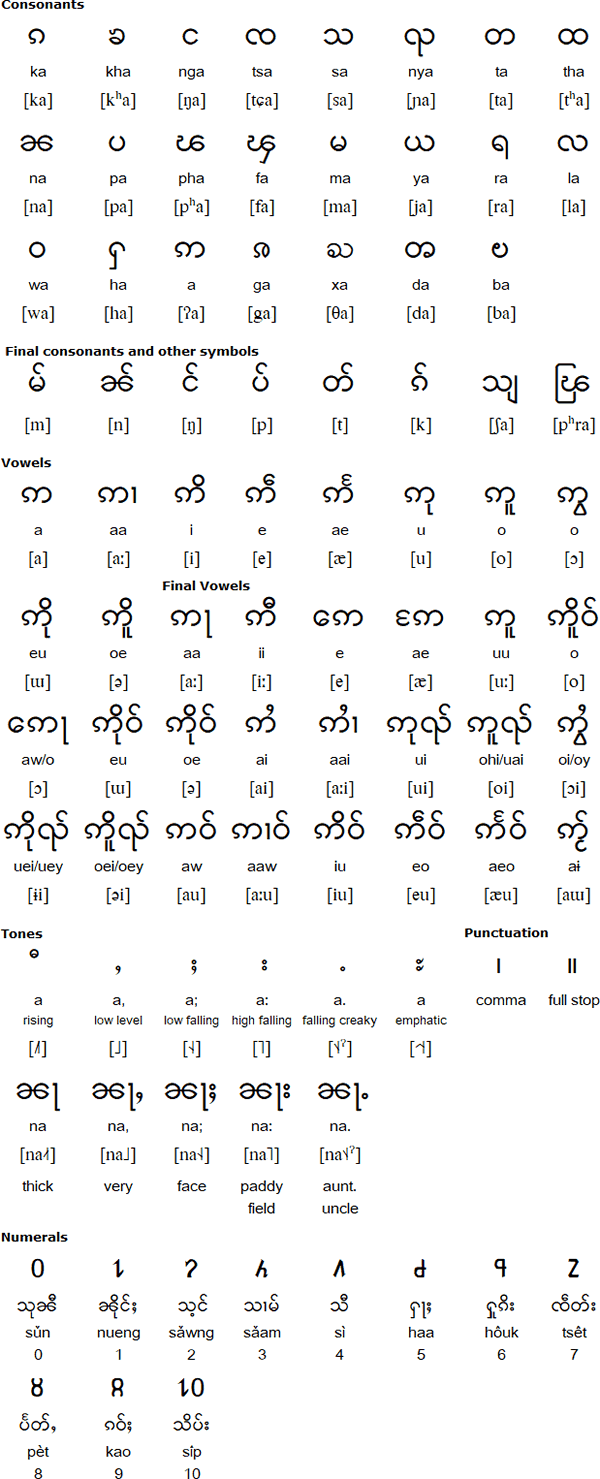Shan is a Southwestern Tai language spoken mainly in northern Myanmar, in the states of Northen Shan, Southern Shan, Kachin and Kayah, and in the Mandalay and Sagaing regions. There are also Shan speakers in Chiang Mai, Mae Hong Son, and Tak provinces in northern Thailand, and in the Xishuangbanna Dai Autonomous Prefecture of Yunnan province in southwestern China. In 2017 there were about 4.59 million speakers of Shan in Myanmar, and in 2006 there were about 95,000 Shan speakers in Thailand.
Written Shan is known as လိၵ်ႈတႆး [lik táj], while spoken Shan is known as ၵႂၢမ်းတႆး [kwáːm táj] or ၽႃႇသႃႇတႆး [pʰàːsʰàː táj]. Other names for Shan include: Burmese Shan, Great Thai, Sam, Sha, Shan Bama, Shan Gyi, Tai, Tai Long, Tai Luang, Tai Shan, Tai Yai, Tai-Lon and Thai Yai.
The Shan script is used in Burma to write Shan, although few Shan speakers can read it. The Burmese / Myanmar script is also used. In China a script similar to Dehong Dai (Tai Le) is used.

How to write the Shan alphabet

All human beings are born free and equal in dignity and rights. They are endowed with reason and conscience and should act towards one another in a spirit of brotherhood.
(Article 1 of the Universal Declaration of Human Rights)
Information about Shan | Numbers | Tower of Babel
Information about the Shan language and alphabet
http://en.wikipedia.org/wiki/Shan_language
https://www.ethnologue.com/language/shn
http://www.skyknowledge.com/shan.htm
Ahom, Aiton, Bouyei, Isan, Kam, Khamti, (Tai) Khün, Lao, Lue, Northern Thai (Kam Mueang), Nùng, Shan, Sui, Tai Dam, Tai Dón, Tai Hongjin, Tai Laing, Tai Nuea, Tai Phake, Tai Ya, Tai Yo, Thai, Thai Song, Yang Zhuang, Zhuang
Ahom, Aima, Arleng, Badagu, Badlit, Basahan, Balinese, Balti-A, Balti-B, Batak, Baybayin, Bengali, Bhaiksuki, Bhujimol, Bilang-bilang, Bima, Blackfoot, Brahmi, Buhid, Burmese, Carrier, Chakma, Cham, Cree, Dehong Dai, Devanagari, Dham Lipi, Dhankari / Sirmauri, Ditema, Dives Akuru, Dogra, Ethiopic, Evēla Akuru, Fox, Fraser, Gond, Goykanadi, Grantha, Gujarati, Gunjala Gondi, Gupta, Gurmukhi, Halbi Lipi, Hanifi, Hanuno'o, Hočąk, Ibalnan, Incung, Inuktitut, Jaunsari Takri, Javanese, Kaithi, Kadamba, Kamarupi, Kannada, Kawi, Kharosthi, Khema, Khe Prih, Khmer, Khojki, Khudabadi, Kirat Rai, Kōchi, Kodava Lipi, Komering, Kulitan, Kurukh Banna, Lampung, Lanna, Lao, Lepcha, Limbu, Lontara/Makasar, Lota Ende, Magar Akkha, Mahajani, Malayalam, Meitei (Modern), Manpuri (Old), Marchen, Meetei Yelhou Mayek, Meroïtic, Masarm Gondi, Modi, Mon, Mongolian Horizontal Square Script, Multani, Nandinagari, Newa, New Tai Lue, Ojibwe, Odia, Ogan, Pahawh Hmong, Pallava, Phags-pa, Purva Licchavi, Qiang / Rma, Ranjana, Rejang (Kaganga), Sasak, Savara, Satera Jontal, Shan, Sharda, Sheek Bakrii Saphaloo, Siddham, Sinhala, Sorang Sompeng, Sourashtra, Soyombo, Sukhothai, Sundanese, Syloti Nagri, Tagbanwa, Tai Noi, Takri, Tamil, Tanchangya (Ka-Pat), Tani, Thaana, Telugu, Thai, Tibetan, Tigalari, Tikamuli, Tocharian, Tolong Siki, Vatteluttu, Warang Citi
Page last modified: 16.03.23
[top]
You can support this site by Buying Me A Coffee, and if you like what you see on this page, you can use the buttons below to share it with people you know.

If you like this site and find it useful, you can support it by making a donation via PayPal or Patreon, or by contributing in other ways. Omniglot is how I make my living.
Note: all links on this site to Amazon.com, Amazon.co.uk
and Amazon.fr
are affiliate links. This means I earn a commission if you click on any of them and buy something. So by clicking on these links you can help to support this site.
[top]